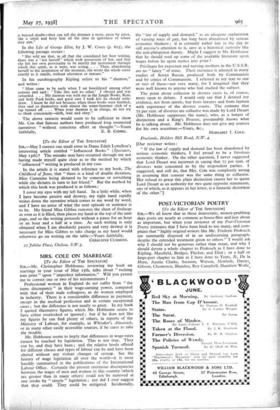• MRS. COLE ON MARRIAGE
[To the Editor of THE SPECTATOR]
SIR,—Mr. Christopher Hobhouse, reviewing my book on marriage in your issue of May 13th, talks about "rushing into print" upon "imperfect information." Will you permit me to correct one or two of his misstatements ?
Professional women in England do not suffer from "the same discrepancy" in their wage-earning power, compared with that of their male colleagues, as do women employed in industry. There is a considerable difference in payment, except in the medical profession and in certain exceptional cases ; but the difference is not nearly so great. In my book quoted illustrative figures, which Mr. Hobhouse seems to have either overlooked or ignored ; but if he does not like my figures he can find plenty of others, in reports of the Ministry of Labour, for example, in Whitaker's Almanack, or in many other easily accessible sources, if he cares Co take the trouble.
Mr. Hobhouse seems to imply that differences in wage-rates cannot be touched by legislation. This is not true. They can be, and they have been ; and the relative levels offered for different classes and types of labour can be and have been altered without any violent changes of systetn. See the history of wage legislation all over the world—it is most handily summarised in the publications of the 'International Labour Office. Certainly the present enormous discrepancies between the wages of men and women in this country (which are greater than in many others) could not be removed at one stroke by " simple " legislation ; nor did I ever suggest that they could. They could be mitigated. Incidentally,
the "law of supply and demand," as an adequate explanation of varying rates of pay, has long been abandoned by serious economic thinkers ; it is certainly rather late in the day to call anyone's attention to it, save as a historical curiosity like the anti-phlogiston theory. Might I suggest to Mr. Hobhouse that he should read up some of the available literature upon wages before he again rushes into print ?
Privileges for expectant and nursing mothers in the U.S.S.R. are no " fancy " of mine. Their existence is attested in many studies of Soviet Russia, produced both by Communists and by critics of Communism. I referred in my text to one or two of these—not very many, for I imagined that they were well known to anyone who had studied the subject.
The point about collusion in divorce cases is, of course, more open to debate. I would only say that I derived my evidence, not from novels, but from lawyers and from laymen with experience of the divorce courts. The estimate that 75 per cent. of divorces are collusive was made by Lord Desart (Mr. Hobhouse suppresses the name), who, as a lawyer of distinction and a King's Proctor, presumably knows what he is talking about. Mr. Hobhouse does not give any sources for his own assertions.—Yours, &c.,
MARGARET I. COLE. Freelands, Holders Hill Road, N.W. 4.
[Our reviewer writes : "If the law of supply and demand has been abandoned by serious economic thinkers, I feel proud to be a frivolous economic thinker. On the other question, I never suggested that Lord Desart was incorrect in saying that 75 per cent, of divorces were consented to by the respondent parties. I suggested, and still do, that Mrs. Cole was completely wrong in assuming that consent was the same thing as collusion. Her refusal to grasp this plain distinction causes her to quote Lord Desart as an authority for two quite opposite statements, one of which, as it appears in her letter, is a fantastic distortion Of the other."]


















































 Previous page
Previous page